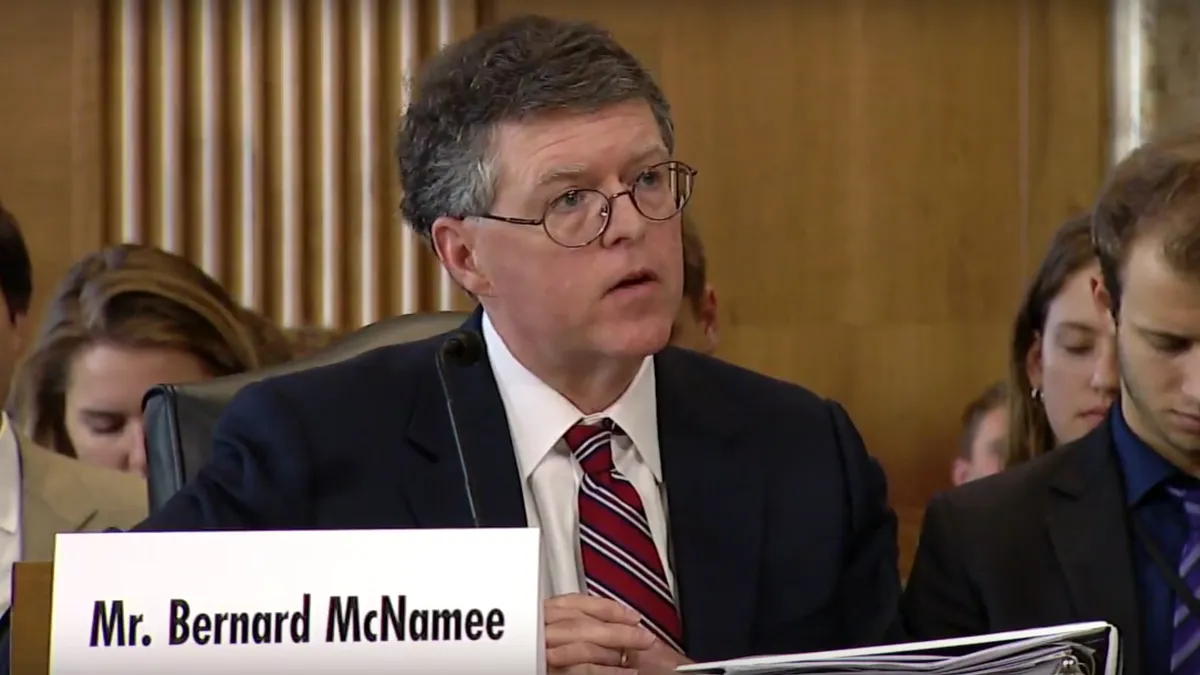Dive Brief:
-
Federal energy regulators on Thursday dismissed a proposal that would have effectively upended an essential solar policy, according to clean energy advocates.
-
All four commissioners on the Federal Energy Regulatory Commission struck down the petition first proposed in April on procedural grounds, arguing that it "does not identify a specific controversy or harm that the Commission should address in a declaratory order to terminate a controversy or to remove uncertainty." The petition had broadly asked FERC to declare that all behind-the-meter generation be considered a wholesale sale, subject to federal regulation.
-
Though all four commissioners voted against the petition, Commissioners James Danly and Bernard McNamee issued separate concurrence statements, with McNamee's indicating the commission still has jurisdiction to rule on the matter through another avenue later.
Dive Insight:
The New England Ratepayers Association's (NERA) petition was opposed by a wide swath of industry leaders, environmentalists, bipartisan government officials, legal experts and others. In total, almost 50,000 groups and individuals issued comments in opposition, while just 21 supported it.
"NERA's petition to attack rooftop solar investments and gut energy savings during a health and financial crisis was ill-conceived," Adam Browning, executive director of Vote Solar, said in a statement. Vote Solar and Solar United Neighbors drove over 20,000 comments in opposition to the petition by the filing deadline.
FERC dismissed the NERA petition on the grounds that the group was unable to point to a particular harm.
Instead, NERA "asked the commission to make certain jurisdictional determinations regarding energy sales from rooftop solar facilities, and other distributed generation located on the customer side of the retail meter," said Chatterjee. "Declaratory orders to terminate a controversy, or remove uncertainty, are discretionary. We exercise that discretion today and find that the issues presented in the petition do not warrant a generic statement from the commission at this time."
But NERA saw the commission's order and the two commissioner's concurrence statements as a sign the issue could be raised again.
"While we are disappointed by FERC’s decision to dismiss our [p]etition on procedural grounds this issue is far from resolved," Marc Brown, president of NERA, said in a statement. "FERC demonstrably leaves the door open for NERA to address the concerns raised by the Commissioners in its order."
McNamee clarified that his vote on the order did not mean the issue of jurisdiction over net metering could not be raised at the commission.
"[T]he Commission's Order is not a decision on whether the Commission lacks jurisdiction over the energy sales made through net metering; nor is it a decision on the merits of the issues raised by and contained in the Petition," he said. McNamee pointed to other avenues where the issue could potentially be brought up, such as through a formal Section 206 complaint directly at a specific state net metering law, or a commission-initiated rulemaking.
"I think Commissioner McNamee is signaling that this issue could come back to the Commission in another form and be entertained on the merits," Jeff Dennis, general counsel and managing director at Advanced Energy Economy, told Utility Dive in an email.
Danly's concurrence statement, on the other hand, raised the issue more broadly.
"I write separately because I have concerns about the consequences of this decision," he said in his statement. "I have yet to reach any conclusion regarding either rate treatment or jurisdictional boundaries, but I am certain that these are questions of profound importance and the Commission will eventually have to address them. I am concerned that dismissing the petition on procedural grounds may well result in a patchwork quilt of conflicting decisions if the questions raised in the petition are instead presented to federal district courts across the country."
But Dennis noted that any action FERC takes comes with potential litigation and inconsistent outcomes across states and district courts.
"Ultimately FERC can render a decision with its views, but only federal courts can preempt state law. So I think Commissioner Danly's concerns exist regardless," he said.
NERA said it "will review the decision to determine the appropriate course of action we will take in order to ensure that ratepayers are protected from the billions of dollars in cost-shifts unwittingly and unfairly paid by ratepayers to support the rooftop solar industry."














